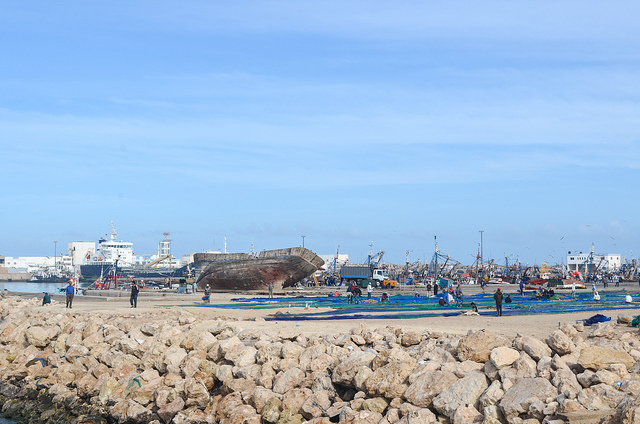Updated
Western Sahara – Facts on the Ground – Robert M. Holley

El Marsa, port of Laayoune Photo: jbdodane
Robert M. Holley
July 3, 2018
With impending visits to the region scheduled by UN Personal Envoy Kohler and US Deputy Secretary of State Sullivan, the Moroccan American Center for Policy (MACP) recently convened an informal discussion of circumstances in Morocco’s southern Saharan provinces.
We were pleased that many of our contacts in government, business and the think tank community in Washington with considerable experience in the region took time from their busy schedules to come and share their impressions of how circumstances are developing in southern Morocco.
Our discussion focused mainly on views of developments on the ground and avoided any deep dive into the international effort to find a “mutually acceptable political solution” to the problem in Western Sahara. For our reader’s interest, here are a few of the more important consensus views of the group.
- Everyone agreed that Morocco has made a very substantial effort to improve the quality of life for those living in the region through major investments in roads, ports, airports, schools, hospitals, clinics, telecommunications networks and other essential infrastructure needs. This work continues and is widely viewed as very positive in the community.
- The consensus view was that while important human rights issues were still evident in the political life of the region, these concerns were being exaggerated by partisan media coverage. The political space for public discussion was viewed as largely open even though those expressing views challenging the government’s position were still being routinely subject to various forms of political pressure that raised human rights issues around the questions of free expression, association and judicial probity.
- Most importantly, the group had the overall impression that there is still a tangible sense of second class citizenship among many in the Sahrawi population of the region. Progress has been made, but there is still much that needs to be done in terms of integration to give this community a sense of full belonging. Our group noted that too many Sahrawis still feel that preferential treatment is accorded to non-Sahrawi residents in terms of opportunities for business, education and employment opportunities.
- Civil society, the group agreed, remains too dependent on insufficient government support and lack of outside assistance to play its full role in the social, cultural and political life of the community. There is a clear need, the group agreed, to assist civil society in its capacity building effort to allow it to become a more fully integrated and effective part of the community.
- Constitutional, legislative and executive initiatives have created new and important opportunities for local elected officials to assume greater responsibility for decision making on local issues, however there is a clear lack of capacity in local government bodies to effectively exercise their newly acquired duties and not enough is being done to bridge this gap in a timely manner. This contributes to the sense of exclusion felt by some in the Sahrawi community. Civil Service reform at the local level is also a pressing need.
- As elsewhere in Morocco, youth unemployment is a major issue. The group agreed that more must be done to diversify the local economy and develop its potential competitive sectors to relieve the pressure. Too much of the region’s economic life remains overly dependent on government subsidy and activity. More must be done to engage private sector investment.
